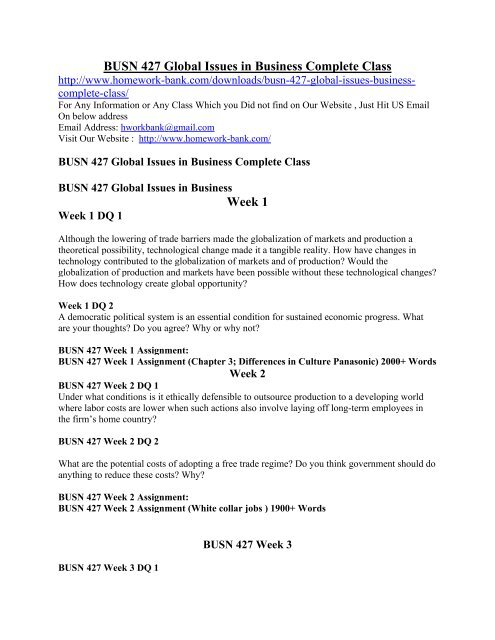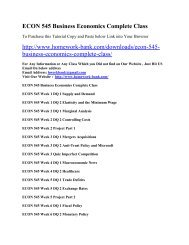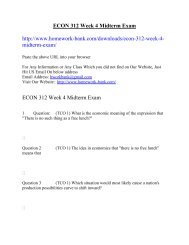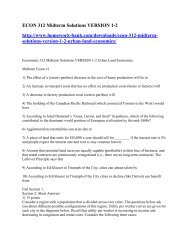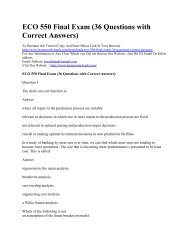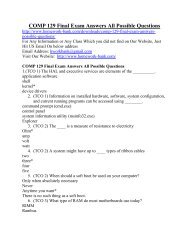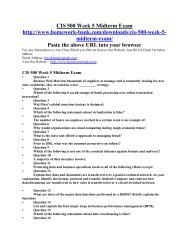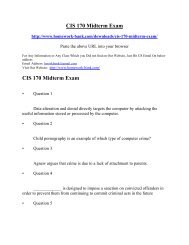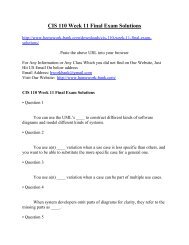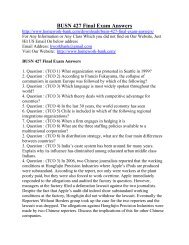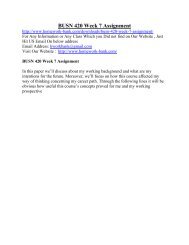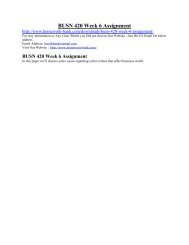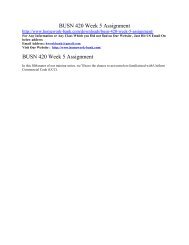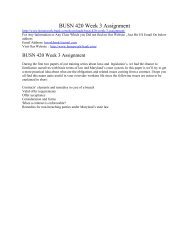BUSN 427 Global Issues in Business Complete Class Week 1
For Any Information or Any Class Which you Did not find on Our Website , Just Hit US Email On below address Email Address: hworkbank@gmail.com Visit Our Website : http://www.homework-bank.com/
For Any Information or Any Class Which you Did not find on Our Website , Just Hit US Email On below address
Email Address: hworkbank@gmail.com
Visit Our Website : http://www.homework-bank.com/
You also want an ePaper? Increase the reach of your titles
YUMPU automatically turns print PDFs into web optimized ePapers that Google loves.
<strong>BUSN</strong> <strong>427</strong> <strong>Global</strong> <strong>Issues</strong> <strong>in</strong> Bus<strong>in</strong>ess <strong>Complete</strong> <strong>Class</strong><br />
http://www.homework-bank.com/downloads/busn-<strong>427</strong>-global-issues-bus<strong>in</strong>esscomplete-class/<br />
For Any Information or Any <strong>Class</strong> Which you Did not f<strong>in</strong>d on Our Website , Just Hit US Email<br />
On below address<br />
Email Address: hworkbank@gmail.com<br />
Visit Our Website : http://www.homework-bank.com/<br />
<strong>BUSN</strong> <strong>427</strong> <strong>Global</strong> <strong>Issues</strong> <strong>in</strong> Bus<strong>in</strong>ess <strong>Complete</strong> <strong>Class</strong><br />
<strong>BUSN</strong> <strong>427</strong> <strong>Global</strong> <strong>Issues</strong> <strong>in</strong> Bus<strong>in</strong>ess<br />
<strong>Week</strong> 1<br />
<strong>Week</strong> 1 DQ 1<br />
Although the lower<strong>in</strong>g of trade barriers made the globalization of markets and production a<br />
theoretical possibility, technological change made it a tangible reality. How have changes <strong>in</strong><br />
technology contributed to the globalization of markets and of production? Would the<br />
globalization of production and markets have been possible without these technological changes?<br />
How does technology create global opportunity?<br />
<strong>Week</strong> 1 DQ 2<br />
A democratic political system is an essential condition for susta<strong>in</strong>ed economic progress. What<br />
are your thoughts? Do you agree? Why or why not?<br />
<strong>BUSN</strong> <strong>427</strong> <strong>Week</strong> 1 Assignment:<br />
<strong>BUSN</strong> <strong>427</strong> <strong>Week</strong> 1 Assignment (Chapter 3; Differences <strong>in</strong> Culture Panasonic) 2000+ Words<br />
<strong>Week</strong> 2<br />
<strong>BUSN</strong> <strong>427</strong> <strong>Week</strong> 2 DQ 1<br />
Under what conditions is it ethically defensible to outsource production to a develop<strong>in</strong>g world<br />
where labor costs are lower when such actions also <strong>in</strong>volve lay<strong>in</strong>g off long-term employees <strong>in</strong><br />
the firm’s home country?<br />
<strong>BUSN</strong> <strong>427</strong> <strong>Week</strong> 2 DQ 2<br />
What are the potential costs of adopt<strong>in</strong>g a free trade regime? Do you th<strong>in</strong>k government should do<br />
anyth<strong>in</strong>g to reduce these costs? Why?<br />
<strong>BUSN</strong> <strong>427</strong> <strong>Week</strong> 2 Assignment:<br />
<strong>BUSN</strong> <strong>427</strong> <strong>Week</strong> 2 Assignment (White collar jobs ) 1900+ Words<br />
<strong>BUSN</strong> <strong>427</strong> <strong>Week</strong> 3 DQ 1<br />
<strong>BUSN</strong> <strong>427</strong> <strong>Week</strong> 3
How might the political ideology of a host government <strong>in</strong>fluence the process of negotiat<strong>in</strong>g<br />
access between the host government and a foreign MNE? In what ways or for what reasons<br />
might a country encourage or discourage FDI because of its ideology?<br />
<strong>BUSN</strong> <strong>427</strong> <strong>Week</strong> 3 DQ 2<br />
What are the economic and political arguments for regional economic <strong>in</strong>tegration? Given these<br />
arguments, why don’t we see more <strong>in</strong>tegration <strong>in</strong> the world economy?<br />
<strong>BUSN</strong> <strong>427</strong> <strong>Week</strong> 3 Assignment:<br />
<strong>BUSN</strong> <strong>427</strong> <strong>Week</strong> 3 Assignment (Chapter 7 Case Analysis CEMEX)<br />
<strong>BUSN</strong> <strong>427</strong> <strong>Week</strong> 4 DQ 1<br />
<strong>Week</strong> 4<br />
Go to the Toys “R” Us sites for both the United States (www.toysrus.com) and the United<br />
K<strong>in</strong>gdom (www.toysrus.co.uk) and try to identify price differences between markets. As a<br />
consumer, do you have the right to demand equal prices? Why? As a company, how should you<br />
respond to compla<strong>in</strong>ts regard<strong>in</strong>g pric<strong>in</strong>g structures?<br />
<strong>BUSN</strong> <strong>427</strong> <strong>Week</strong> 4 DQ 2<br />
The standard IMF policy prescribes tight monetary policy and reduced government spend<strong>in</strong>g for<br />
develop<strong>in</strong>g nations experienc<strong>in</strong>g a currency crisis. Is this always the right course of action? If<br />
there was an alternate approach, how would it affect <strong>in</strong>ternational bus<strong>in</strong>esses?<br />
<strong>BUSN</strong> <strong>427</strong> <strong>Week</strong> 4 Assignment:<br />
<strong>BUSN</strong> <strong>427</strong> <strong>Week</strong> 4 Course Project (BURLINGTON COAT FACTORY) 1450+ Words<br />
<strong>BUSN</strong> <strong>427</strong> <strong>Week</strong> 5 DQ 1<br />
<strong>Week</strong> 5<br />
Do the Internet and <strong>in</strong>ternational e-commerce change the choice of us<strong>in</strong>g a transnational strategy<br />
that has historically been successful for firms expand<strong>in</strong>g globally? Would it make a difference if<br />
a firm relied heavily on traditional bus<strong>in</strong>ess channels versus just e-commerce?<br />
<strong>BUSN</strong> <strong>427</strong> <strong>Week</strong> 5 DQ 2<br />
From the perspective of a domestic firm, what are the advantages and disadvantages of licens<strong>in</strong>g<br />
the rights to the company’s production process and trademark to a firm <strong>in</strong> a foreign country?<br />
What are some of the ways that a firm can reduce the risk of los<strong>in</strong>g its proprietary know-how to<br />
foreign companies through licens<strong>in</strong>g agreements?<br />
<strong>BUSN</strong> <strong>427</strong> <strong>Week</strong> 5 Assignment<br />
<strong>BUSN</strong> <strong>427</strong> <strong>Week</strong> 5 Assignment (Chapter 11 Case Analysis Proctor and Gamble) 1050+<br />
Words
<strong>BUSN</strong> <strong>427</strong> <strong>Week</strong> 6 DQ 1<br />
<strong>Week</strong> 6<br />
How might a company make strategic use of countertrade schemes as market<strong>in</strong>g weapons to<br />
generate export sales revenues? What are the risks associated with pursu<strong>in</strong>g such a strategy?<br />
<strong>BUSN</strong> <strong>427</strong> <strong>Week</strong> 6 DQ 2<br />
What are make-or-buy decisions? What are the advantages of make versus buy and visa versa?<br />
Are<br />
<strong>BUSN</strong> <strong>427</strong> <strong>Week</strong> 6 Assignment:<br />
<strong>BUSN</strong> <strong>427</strong> <strong>Week</strong> 6 Assignment (Chapter 14 Case Analysis Boe<strong>in</strong>g 787) 1050+ Words<br />
<strong>Week</strong> 7<br />
<strong>BUSN</strong> <strong>427</strong> <strong>Week</strong> 7 DQ 1<br />
With<strong>in</strong> 20 years we will have seen the emergence of enormous global markets for standardized<br />
consumer products. Do you agree with this statement? Why or why not?<br />
<strong>BUSN</strong> <strong>427</strong> <strong>Week</strong> 7 DQ 2<br />
What is the l<strong>in</strong>k between an <strong>in</strong>ternational bus<strong>in</strong>ess’s strategy and its human resource<br />
management policies, particularly with regard to the use of expatriate employees and their pay<br />
scales?<br />
<strong>BUSN</strong> <strong>427</strong> <strong>Week</strong> 7 Assignments:<br />
<strong>BUSN</strong> <strong>427</strong> <strong>Week</strong> 7 F<strong>in</strong>al Group Project (Group D)BURLINGTON COAT FACTORY 5200<br />
Words<br />
<strong>BUSN</strong> <strong>427</strong> <strong>Week</strong> 7 Peer Review<br />
<strong>BUSN</strong> <strong>427</strong> <strong>Week</strong> 8 F<strong>in</strong>al Exam<br />
1. Question : (TCO 1) What organization was protested <strong>in</strong> Seattle <strong>in</strong> 1999?<br />
2. Question : (TCO 2) Accord<strong>in</strong>g to Francis Fukuyama, the collapse of communism <strong>in</strong> eastern<br />
Europe was followed by which of the follow<strong>in</strong>g?<br />
3. Question : (TCO 3) Which language is most widely spoken throughout the world?<br />
4. Question : (TCO 3) Which theory deals with competitive advantage for countries?<br />
5. Question : (TCO 4) In the last 30 years, the world economy has seen<br />
6. Question : (TCO 5) Chile is <strong>in</strong>cluded <strong>in</strong> which of the follow<strong>in</strong>g regional <strong>in</strong>tegrations<br />
organizations?<br />
7. Question : (TCO 6) When a firm engages <strong>in</strong> hedg<strong>in</strong>g it is<br />
1. Question : (TCO 8) What are the three staff<strong>in</strong>g policies available to a mult<strong>in</strong>ational<br />
corporation?<br />
2. Question : (TCO 8) In distribution strategy, what are the four ma<strong>in</strong> differences between<br />
countries?
3. Question : (TCO 3) India’s caste system has been around for many years. Expla<strong>in</strong> why its<br />
<strong>in</strong>fluence has dim<strong>in</strong>ished among educated urban middle class Indians.<br />
4. Question : (TCO 3) In 2006, two Ch<strong>in</strong>ese journalists reported that the work<strong>in</strong>g conditions at<br />
Hongfuj<strong>in</strong> Precision Industries where Apple’s iPods are produced were substandard. Accord<strong>in</strong>g<br />
to the report, not only were workers at the plant poorly paid, but they were also forced to work<br />
overtime. Apple immediately responded to the allegations and audited the factory <strong>in</strong> question.<br />
However, managers at the factory filed a defamation lawsuit aga<strong>in</strong>st the two journalists. Despite<br />
the fact that Apple’s audit did <strong>in</strong>deed show substandard work<strong>in</strong>g conditions at the factory,<br />
Hongfuj<strong>in</strong> did not withdraw the lawsuit. Eventually the Reporters Without Borders group took<br />
up the case for the two reporters and the lawsuit was dropped. The allegations aga<strong>in</strong>st Hongfuj<strong>in</strong><br />
Precision Industries were made by two Ch<strong>in</strong>ese reporters. Discuss the implications of this for<br />
other Ch<strong>in</strong>ese companies.<br />
5. Question : (TCO 3) Exports are largely responsible for Ch<strong>in</strong>a’s recent rapid economic growth.<br />
The country, capitaliz<strong>in</strong>g on its cheap labor force, has focused on convert<strong>in</strong>g raw materials <strong>in</strong>to<br />
products that are exported to developed countries such as the United States. In 2008, Ch<strong>in</strong>a’s<br />
trade surplus was a record $280 billion, and its hold<strong>in</strong>gs of foreign exchange reserves were over<br />
$1.95 trillion. Some critics have suggested that Ch<strong>in</strong>a is follow<strong>in</strong>g a neomercantilist policy. Are<br />
the claims that Ch<strong>in</strong>a is follow<strong>in</strong>g a neomercantilist policy valid? Why or why not?<br />
6. Question : (TCO 4) Telefonica is a Spanish telecommunications firm. For decades, Telefonica<br />
had operated as a typical state-owned enterprise, but privatization and deregulation changed that<br />
path <strong>in</strong> the 1990s. Telefonica began to aggressively pursue expansion opportunities <strong>in</strong> Lat<strong>in</strong><br />
America where it quickly became the number one or two player <strong>in</strong> nearly every country. Later,<br />
Telefonica turned its sights on Europe where its acquisitions helped transform the company <strong>in</strong>to<br />
the second biggest mobile phone operator <strong>in</strong> the world. What changes <strong>in</strong> political and economic<br />
environment allowed Telefoncia to start expand<strong>in</strong>g globally? Why did Telefonica <strong>in</strong>itially focus<br />
on Lat<strong>in</strong> America? Why was it slower to expand <strong>in</strong> Europe even though Spa<strong>in</strong> is a member of the<br />
European Union?<br />
7. Question : (TCO 7) Why did the world shift from a gold standard to fixed exchange rates?<br />
1. Question : (TCO 5) Concern<strong>in</strong>g European Union’s progress toward creat<strong>in</strong>g a s<strong>in</strong>gle f<strong>in</strong>ancial<br />
market, the quest started <strong>in</strong> 1999 was to have been completed by 2005, however, progress has<br />
been slowed by various factors related to the tradition of each member country operat<strong>in</strong>g<br />
autonomously. By 2007, significant progress had been made. Some 41 measures designed to<br />
create a s<strong>in</strong>gle market were <strong>in</strong> place and others were <strong>in</strong> the pipel<strong>in</strong>e. The current issue fac<strong>in</strong>g the<br />
EU revolves around the enforcement of the rules that have been established as law. Some experts<br />
believe that it will be at least another decade before the benefits of the new rules become<br />
apparent. Discussion of this feature can beg<strong>in</strong> with the follow<strong>in</strong>g questions. What are the benefits<br />
of creat<strong>in</strong>g a s<strong>in</strong>gle f<strong>in</strong>ancial market <strong>in</strong> the European Union for companies? Does it make sense<br />
for consumers?<br />
2. Question : (TCO 6) In the 1980s, Caterpillar was negatively affected by a strong dollar and<br />
lost significant market share to Japanese competitor Komatsu. The situation prompted Caterpillar<br />
to revise its global strategy and by the 2000s, the company was <strong>in</strong> a much better position to deal<br />
with volatile currency values. More recently, a strong dollar has actually helped boost<br />
Caterpillar’s bottom l<strong>in</strong>e. In the 1980s, a stronger dollar hurt Caterpillar’s competitive position,<br />
but <strong>in</strong> 2008 a stronger dollar did not seem to have the same effect. What had changed?<br />
3. Question : (TCO 7) In May 2001, the IMF agreed to lend $8 billion to Turkey to help stabilize<br />
its economy and halt a sharp slide <strong>in</strong> the value of its currency. Although <strong>in</strong>itially the Turkish
government resisted IMF mandates on economic policy, <strong>in</strong> 2003 the government passed an<br />
austerity budget. By 2005, significant progress had been made and today, the country appears to<br />
be on track for recovery, with lower <strong>in</strong>flation rates, an <strong>in</strong>crease <strong>in</strong> privatization, and a budget<br />
surplus. What led to Turkey’s f<strong>in</strong>ancial crisis? What goals did the IMF establish as part of the<br />
loan agreement?<br />
4. Question : (TCO 8) MD International is an export <strong>in</strong>termediary for U.S. medical equipment<br />
manufacturers. The company has been able to capitalize on fall<strong>in</strong>g trade barriers, as well as<br />
expand healthcare programs <strong>in</strong> the Lat<strong>in</strong> American region. MD International currently represents<br />
more than 30 companies and sells to some 600 regional distributors. How does an <strong>in</strong>termediary<br />
such as MD International create value for the manufacturers who use it to sell medical equipment<br />
<strong>in</strong> foreign markets? Why do they want to use MD International rather than export directly<br />
themselves?<br />
5. Question : (TCO 8) Boe<strong>in</strong>g made the decision to outsource much of the production of the 787<br />
<strong>in</strong> the hopes of significantly reduc<strong>in</strong>g the time to get the<br />
product to market. Boe<strong>in</strong>g also anticipated that its outsourc<strong>in</strong>g strategy would allow it to<br />
generate additional sales from the countries that were partners <strong>in</strong> the process and reduce its costs<br />
and risks. Although Boe<strong>in</strong>g’s strategy worked for some components, for other parts the strategy<br />
was a disaster. Suppliers were late and some produced poor-quality parts, forc<strong>in</strong>g Boe<strong>in</strong>g to<br />
commit additional resources to the project. What are the benefits to Boe<strong>in</strong>g of outsourc<strong>in</strong>g so<br />
much work on the 787 to foreign suppliers? What are the potential risks? Do the benefits<br />
outweigh the risks?<br />
6. Question : (TCO 8) By 2015, Ford hopes to compete <strong>in</strong> North America, Europe, and Asia by<br />
offer<strong>in</strong>g several global models <strong>in</strong>clud<strong>in</strong>g the Fiesta, the Fusion, and the Mondeo. The company,<br />
which refers to its new strategy as One Ford, anticipates that its global models will share the<br />
same components and looks and be positioned <strong>in</strong> a similar way <strong>in</strong> each market <strong>in</strong> which they are<br />
sold. What is beh<strong>in</strong>d Ford’s One Ford vision? What is the company hop<strong>in</strong>g to accomplish with<br />
this strategy?


